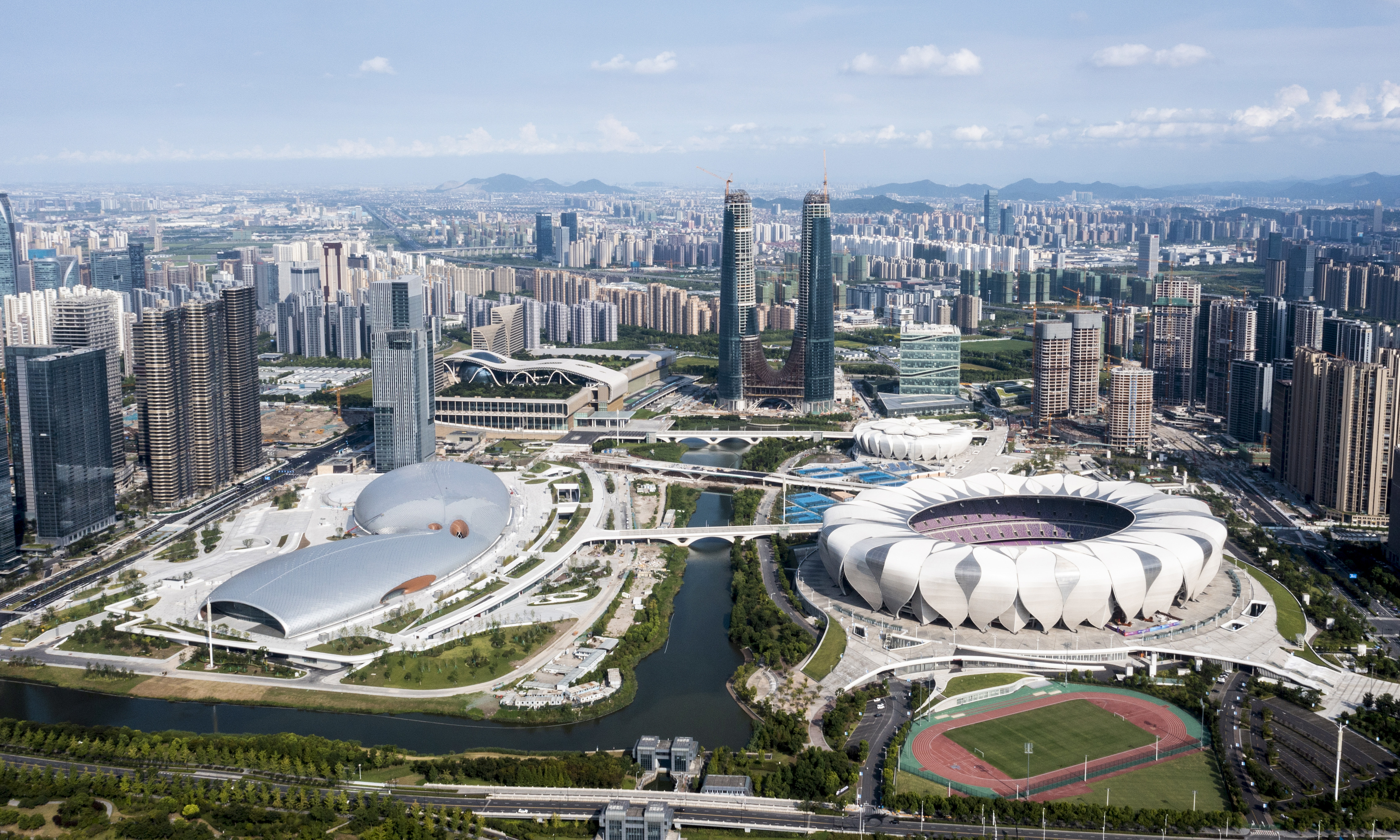Tech-driven Hangzhou Asian Games Coming
The Hangzhou Olympic Sports Centre Stadium (right), nicknamed "Big Lotus," is the main stadium for Hangzhou Asian Games. (PHOTO: XINHUA)
By Staff Reporters
The Hangzhou Asian Games, set to open on September 23, will showcase layers of advanced technologies, similar to China's previous sporting spectacles of Beijing 2022 Winter Olympics and the 31st FISU Summer World University Games in Chengdu.
Comfortable stadium
Nicknamed "Big Lotus," the Hangzhou Olympic Sports Centre Stadium is a key venue for the Games, and will provide a pleasant environment for athletes, spectators and staff.
Apart from a central air conditioning system, Big Lotus adjusts its temperature using river water heat pumps. It is estimated that the energy-saving rate of the pump system exceeds 30 percent.
There is a temperature difference between the Qiantang River and the stadium located on the south bank of the river. In summer, the river temperature is lower than the indoor temperature of the stadium. The river water can absorb the heat in the stadium when it's pumped out of and then back to the river. In winter, it's the other way around.
In order to help the spectators hear clearly what is happening in the stadium, it is equipped with loudspeakers in the auditorium, the competition area and the area providing support. Some of the suspended loudspeakers also amplify sound by cleverly making use of the concave shape of Big Lotus.
In the Jinhua Sports Centre Stadium and Gymnasium, the games venues for sepaktakraw (kick volleyball) and football, there are 288 large lamps used for lighting. Though outdoor light is easy to attract huge numbers of insects in the southern part of China, these lamps don't draw insects.
Couch spectators
The games watching experience at home is also well taken care of. Panorama cameras are installed in the venues to capture 8K ultra high definition livestream footage, which will be transmitted to livestream platforms for viewers to watch via high speed and low latency 5G network.
To provide such high-quality broadcasts on television, the illuminance of lights in the venues is crucial. The above mentioned large lamps in the Jinhua Sports Centre Stadium not only have a high illuminance, but also reduce glare in the venues by specially designed lampshades.
A "bullet time" mode is also available for viewers who wish to watch a certain part of the game frame by frame, such as a specific move of the athlete. Multiple panorama cameras are set in the venues to capture such freeze frame moments, to make the viewer feel as if time has stopped.
The viewers can also experience different points of view via augmented reality (AR). For example, watching a game from the angle of the coaches, the audience or the players when there is a volleyball game on. In addition, multilingual commentary is indispensable for an international event like this. What's interesting is that commentary in local dialects is also an option this time around.
Smart operation
A complicated event like the Hangzhou Asian Games cannot run smoothly without smart systems and mechanisms.
Many of the venues have their "smart brain," a central control system that connects the facilities, terminals, games and people, enabling the operation staff and organizers to have a grasp of real time situations.
In Huanglong Sports Centre, there are about 4,000 facilities in operation, and through the smart brain, the staff can know immediately when there is a malfunction. The smart brain can also monitor human and vehicle traffic, thus conducting real time diversions.
As to the key venue, a 3D model of Big Lotus was created on the cloud based on building information modeling, AR and VR technologies, to help the staff grasp every detail. The smart brain of Big Lotus, and the nearby Aquatic Sports Arena and Gymnasium, can offer support for facial recognition, and guidance for toilets and parking.
Meanwhile, a one-stop digital game watching platform was developed to offer smart and comprehensive service for participants and spectators in 18 scenarios from six aspects, including tickets, food, accommodation, transport, travel and shopping, greatly enhancing the efficiency of service provision.
The Hangzhou Asian Games are almost here, and the adopted advanced technologies are set to provide wonderful experiences for everyone involved.



